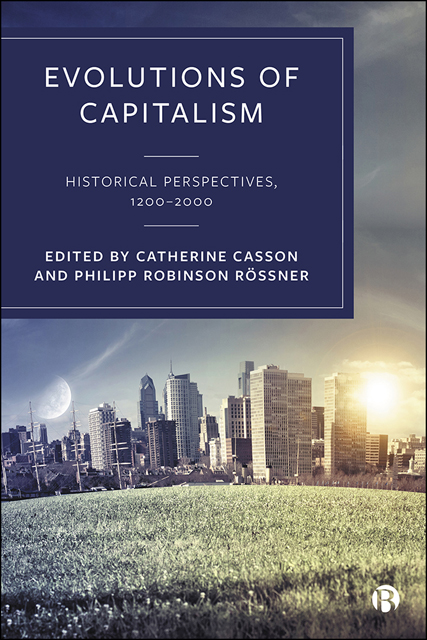Book contents
- Frontmatter
- Contents
- List of Figures and Tables
- Notes on Contributors
- Acknowledgements
- 1 Introduction
- 2 The Market as an Institution: Theory and History
- 3 Regulating Capitalism
- 4 Capitalism and State Ownership Models
- 5 Comparative and Connected Global Capitalism(s)
- 6 Capitalism, Imperialism and the Emergence of an Industrialized Global Economy
- 7 Religion and Capitalism
- 8 Capitalism and the Environment
- 9 Capitalism and Income Inequality
- 10 Conclusion
- Index
1 - Introduction
Published online by Cambridge University Press: 13 October 2022
- Frontmatter
- Contents
- List of Figures and Tables
- Notes on Contributors
- Acknowledgements
- 1 Introduction
- 2 The Market as an Institution: Theory and History
- 3 Regulating Capitalism
- 4 Capitalism and State Ownership Models
- 5 Comparative and Connected Global Capitalism(s)
- 6 Capitalism, Imperialism and the Emergence of an Industrialized Global Economy
- 7 Religion and Capitalism
- 8 Capitalism and the Environment
- 9 Capitalism and Income Inequality
- 10 Conclusion
- Index
Summary
Definition of capitalism
Capitalism is a topic with many thematic strands and both geographical and chronological dimensions. As a result, its definition and interpretation have generated a significant amount of discussion. Regarding thematic strands, some scholars have focused on the political dimension, for example, and others the financial (including Hall and Soskice, 2001; Murphy, 2009; Neal and Williamson, 2014; Piketty, 2014; Kocka, 2016; Banaji, 2020; Lipartito and Jacobson, 2020). Assessments of capitalism's impact are also diverse. While aiding economic growth for some sectors and individuals, significant questions remain regarding the extent to which capitalism has had a positive or negative impact on society as a whole (Piketty, 2014; Beckert, 2015; Lipartito and Jacobson, 2020; Yazdani and Menon, 2020).
It is generally accepted that to understand capitalism fully we should situate it in a wider historical context (Cain and Hopkins, 1986). Marx's analysis of capitalism went back to the Middle Ages, although his primary focus was on the 19th century. Sombart (1927) proposed that a capitalist spirit originated in medieval rulers, administrators, noble estate owners and military leaders, and was disseminated from them to the wider population. Braudel and Britnell saw the Middle Ages as an important step in the transition from a market economy to a later capitalist one. Examining 1000– 1500, Britnell (1993) used the concept of commercialization to describe economic transformation that led to urbanization, entrepreneurship and the provision of a strong institutional framework. Braudel (1981, 1982, 1985) described how, during the 15th– 18th centuries, an informal ‘everyday’ economy developed into a market one and subsequently a capitalist one. In Braudel's analysis finance, in the form of access to credit, created a more sophisticated economy and aided a transition to capitalism by allowing merchants to participate in international markets, where higher profits could be made (Braudel, 1982: 81, 91, 100).
Weber identified the Reformation as a key transition point. He associated capitalism with the ‘accumulation of wealth for its own sake, rather than for the material rewards it can serve to bring’ (Weber, 2001: xi, 18). Protestantism, Weber argued, encouraged individuals to engage with ‘worldly affairs’ rather than try to transcend them (Weber, 2001: xii).
- Type
- Chapter
- Information
- Evolutions of CapitalismHistorical Perspectives, 1200-2000, pp. 1 - 28Publisher: Bristol University PressPrint publication year: 2022

